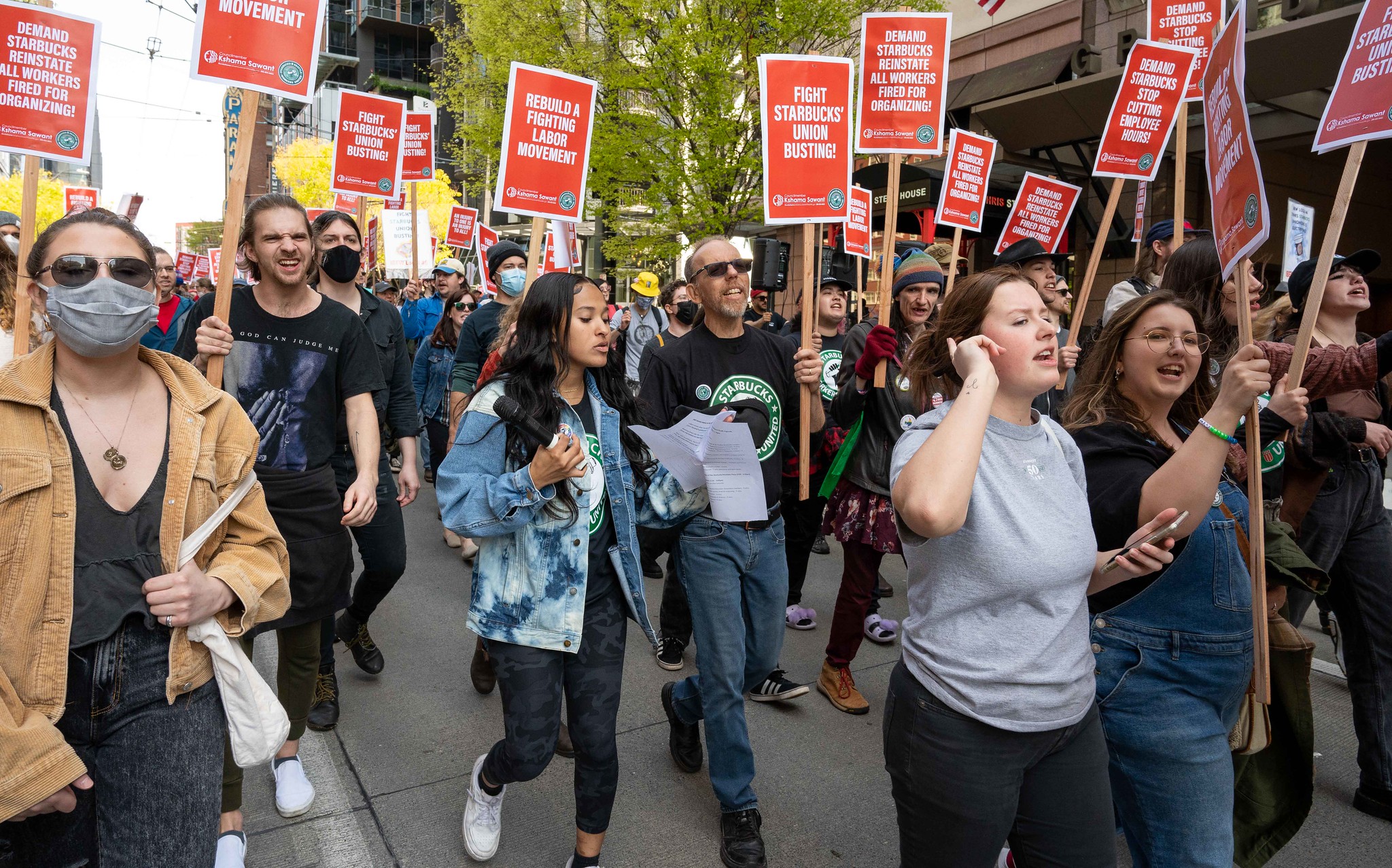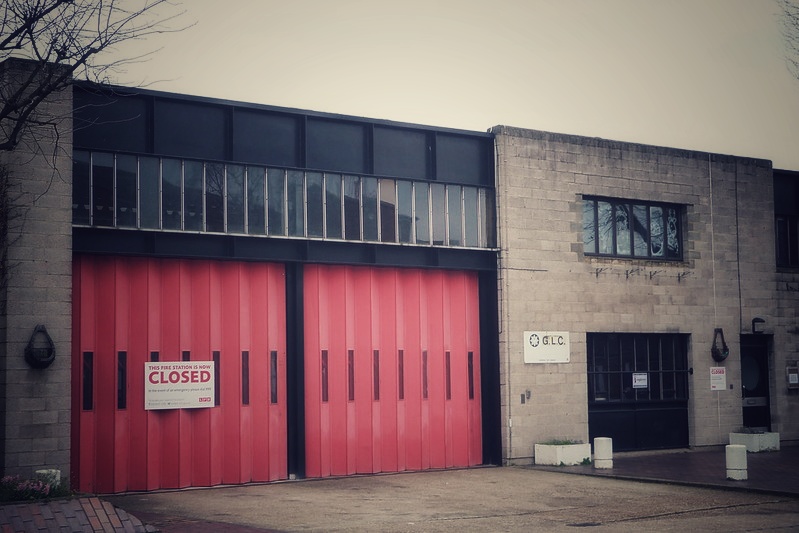Not just here to serve: Hospitality workers ramp up organising
Working in bars and cafes is traditionally seen as gruelling as precarious - too precarious for staff to organise. But this is starting to change.
“Apart from the odd occasion, I don’t think I’ve ever felt as consistently bad in terms of my mental health as I have since I started working here,” says Nick, a chef at a cafe-bar in Glasgow. He began working in the kitchen last April, and it wasn’t long before the “honeymoon period” of a new job evaporated – and the problems he began to notice were plentiful.
The kitchen, says Nick, is severely understaffed. “At most there will be one person in the kitchen at any given time, and it's not a small kitchen,” he says. “So you’re expected to do a 12-hour shift, and do three people’s jobs in that 12 hours.” This means that chefs fall behind on service and regularly end up working 13 to 14 hour shifts, sometimes having to leave the kitchen unfinished if the bar closes before they’re done. “It’s a really unsustainable system,” he says. He adds that kitchen staff would regularly go whole days without a single break.
Health and safety concerns are also a huge issue for workers. “The place is falling apart,” says head chef Brendan. “One of the main problems was our cooker didn’t have knobs on it and some of the burners didn’t work, so that was terrible.” Chefs had to turn the fiery hot metal rods left poking out of the cooker, which left Nick with calluses on his fingers.
Then, there’s the issue of pay. Brendan is on £11.25 an hour – peanuts for a head chef, who are usually paid upwards of £17.50 an hour. Nick makes a pound less, around £2 less per hour than the standard. “I would say we’re one of the lowest paid kitchens in the city centre,” he says.
A Unite survey of hospitality workers in Ireland found that more than half were paid below the living wage, a third were not afforded a proper break
All of these issues inspired Nick, a qualified union representative with Unite, to organise his workplace. Since then, the workers have launched a collective grievance, calling for all of these issues to be fixed. While a few have been addressed, including timed breaks and the cooker’s knobs being replaced, other problems remain.
Not just one workplace
While the issues discussed by Nick and Brendan seem particularly bad, they’re reflective of what many hospitality workers face every day.
Hospitality jobs are some of the most precarious in the country: according to the think tank Autonomy’s Insecurity Index, those who work in customer service and sales roles are some of the most insecure in the country, thanks to low wages and zero-hour contracts.
While there are no recent figures for the UK, a Unite survey of hospitality workers in Ireland found that more than half were paid below the living wage, a third were not afforded a proper break, half did not receive any share of the service charge and more than a third reported to have experienced or witnessed bullying or harassment at work. A more focused UK survey by Unite found that a resounding majority of hospitality staff (86%) have experienced sexual harassment at the hands of either a member of the public or a coworker.
Despite this, hospitality is the sector with one of the lowest union densities, according to Anthony Curley, who heads up Unite’s hospitality organising in the North West. This is partly down to the fact that many hospitality workers are young or migrant workers, who aren’t educated about the trade union movement. High staff turnover is also an issue. However, as Ian Hodson, president of the Bakers Food and Allied Workers Union (BFAWU) explains, “the biggest barrier to organising in the sector is the employers don’t really want their workers unionising”.
This is something Nick experienced at his workplace. “When my manager realised I was a member of the union, he was looking to cut my hours down to force me to leave, effectively, because I was causing hassle,” he says. “That, combined with the terrible equipment, terrible conditions, long hours and no breaks, has definitely taken its toll.”
It’s this behaviour that stops workers from attempting to organise in the first palace, says Curley. “Rampant bullying and harassment in the industry makes it very difficult for people to put their neck on the line,” he says. “It takes a very brave person to do it, but we are seeing that more and more.”
However, Nick also believes that there’s a culture of apathy in hospitality preventing any real organising. “I think that’s a failure of the labour movement,” he says. “I think hospitality has been forgotten for a long time, and these attitudes, that nothing will ever change, have become entrenched.”
That being said, things are starting to look up. In the past few years, Unite has joined BFAWU in supporting hospitality workers, getting “thousands of members” on board. BFAWU successfully won a pay rise for McDonald’s workers in 2018, for example. More recently, Glasgow City Council has passed a motion requiring hospitality businesses to provide free and safe transport home for late-night workers after 23:00 thanks to Unite’s Get Me Home Safely Campaign. Manchester’s mayor has also pledged support for the campaign. The Union also won a fair tips policy at Pizza Express and won a battle to secure £138,000 in withheld tips for hotel workers in Scotland.
"The Unite Hospitality Combine is made up of hospitality members from different employers across the country and is tasked with overseeing a national strategy and offering support to the regions”
These feats have attracted more and more members, with unions putting in more work to recruit new members. Social media has also been a huge help, says Curley, as has on the ground organising. We have found social media to be invaluable in terms of informing people that we exist, what we do, how they can get involved and also in calling out employers,” he says. “In terms of increasing our profile we also leaflet in areas, having a branch definitely helps in this case as our members can go into workplaces and speak with other workers.”
BFAWU, says Hodson, bases its organising strategy on one-to-one conversations. “We go into workplaces and speak to individual workers about issues they’re facing, what we are as a trade union and what trade unionism means and ask them if they want to take part in helping organise that workplace,” he says.
This is exactly how Nick began to organise. “I just started talking to people about it really, and I guess when you keep talking about it and regularly bringing things up and pointing out problems and how the union can help fix them, it does eventually catch on with people,” he says. He adds that last year’s summer of strikes, with the RMT leading the charge, “helped massively” in bringing people on board.
Unite has also decided to split the sector into subsectors, creating specific barista campaigns and bringing together bar workers from different workplaces. Another key part of their strategy is a hospitality combine – a first from Unite and perhaps the trade union as a whole, according to Curley. “The Unite Hospitality Combine is made up of hospitality members from different employers across the country and is tasked with overseeing a national strategy and offering support to the regions.” This is coupled with local branches, who have an intimate knowledge of local companies and can help with which are a big help when increasing Unite’s profile and organising locally. “We know from experience this is the best way of bringing hospitality workers together and giving them confidence as they often feel alone in their place of work,” says Curley.
Another problem, though, is that the majority of these members will be in individual workplaces, meaning they’re the only union member in their place of work, making collective bargaining difficult. However, Hodson says that hospitality workers are generally good at “self-organising,” even if it’s not officially with a union, which can make things easier. “Workers in this sector do have a tendency to be in contact with one another themselves through WhatsApp groups, which the workers have set up themselves,” he says. “And they've done that, in a lot of cases, because of issues they face, whether it's sexual harassment, low pay, or having their tips stolen.” Often, workers will then reach out to a union like BFAWU, or reps on the ground who have noticed a pocket of complaints in one workplace will make a concerted effort to organise that group of workers.
Staff turnover can also halt organisation in a workplace. At his venue, Brendan says they’ve started three separate grievances due to staff leaving. “We had pretty much the entire staff ready to go when we started filling out this grievance, and the majority of them left to get a different job,” he says. “So then it was only a few of us and we couldn’t move forward because we didn’t have the numbers.” After getting the next round of staff on board, the same thing happened again,until finally people stayed long enough for the grievance to be put forward. This isn’t uncommon: last year, an effort to officially unionise The Glory, an LGBTQ bar in London, fell through when the majority of staff involved with the union left to work elsewhere. “I think without a constant drive it kind of fell apart and people have disbanded,” says Ashley, a former worker.
Since the workers at the Glasgow bar finally filed their grievance, they have been given more breaks (although Nick says they haven’t been given any confirmation that this will continue) and some of the faulty equipment has been replaced. However, Brendan says, “it’s mostly cosmetic – it’s all smoke and mirrors”.
Still, it is a step towards a fairer hospitality industry, something Curley believes is just over the horizon.
“Overall I would say there has definitely been a change in terms of how hospitality workers see unions and vice versa,” he says. “It is an incredibly difficult sector to organise which will take years of hard work but the progress we have seen in Unite over the past few years in terms of membership growth and workers winning on issues in their workplace. It’s really inspiring.”
Take Action
If you’re a hospitality worker you can join Unite Hospitality or BFAWU
Pledge support to Unite’s Get Me Home Safely Campaign
If you want to organise your workplace, follow this guide by the Trade Union Congress
The Lead is now on Substack.
Become a Member, and get our most groundbreaking content first. Become a Founder, and join the newsroom’s internal conversation - meet the writers, the editors and more.





